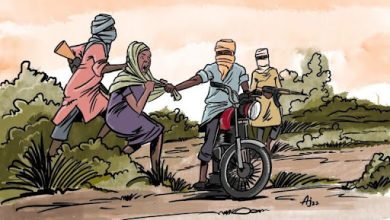Gender-Climate Solutions Are Not A Women-Only Issue, Report Says
Women are being prevented from adapting to new climate realities by traditional gender norms and restrictions. When it comes to the farming and food processing of the future, adapting to new climates will need to be “gender-just”, agricultural analysts say.

In a world where climate change is fundamentally altering the way food is grown and how rural people make their livelihoods, women are being prevented from adapting by traditional gender roles, and this will have serious consequences for everyone.
That is the starting point of a new analysis of the impact of gender issues on food systems around the world, produced in time for the COP27 climate conference in Egypt.
As a result, regions where agriculture, food processing and production are mostly carried out by women will be the most affected by climate crises, a report by the Consultative Group for International Agricultural Research (CGIAR) shows.
CGIAR is a platform that amplifies research and fills gaps that have impacts on gender equality and social inclusion in agriculture and food systems.
Climate change has worsened crop failure, outbreaks of pests, as well as worsening the degradation of land and water resources.
But according to their analysis, the impacts of climate change and climate-related natural disasters are experienced in different ways by different demographics. Gender is a significant determinant of vulnerabilities, and capabilities to adapt to climate shocks that affect food security globally.
Where adapting to new climate conditions requires adopting new methods of farming, new technology or techniques, women who are denied access to education will be at a disadvantage.
The burden of unpaid domestic labour, child care, and the responsibility of caring for older members of the family could prevent women and girls from accessing basic education.
This has limited women’s access to information and knowledge about climate change, making them less prepared for its risk.
Another reason why this gap persists is women’s tendency to have lower economic status than men. The CGIAR analysis iterated how women’s capabilities to deal with climate change in food systems is reduced because, “access, ownership and control of productive and financial resources are important aspects that build capabilities of women farmers to cope with the impacts.”
HumAngle has also reported how international development projects in Nigeria are increasing, but funding targeting women’s economic empowerment has remained the same since 2015.
In addition, women’s options to diversify their means of livelihood are limited. The report gave examples of how, when climate-related changes in cropping patterns and livestock production have been observed, men may adopt migrating to relatively better areas, something not necessarily open to women.
“Women belonging to the lower castes or ethnic minorities are confronted with increasing work burdens, loss of support, and, in the face of limited resources, increased vulnerabilities,” the analysis said, explaining that increased labour responsibilities does not necessarily result in increased finances, social networks or knowledge.
The consequences.
The lack of “gender-just” climate action especially in the agriculture and food sector could exacerbate the ongoing food crises because there are more women than men in the agricultural labour force.
“The greater the gender equality gap, the hungrier people are,” a report by CARE International notes, adding that it is a cruel irony given women’s vital role in food systems. “We cannot reach the goal of zero hunger nor tackle the current crisis without tackling this great injustice,” it said.
In September, the UN revealed that efforts made towards achieving Zero Hunger (SDG2) have suffered a devastating setback due to adverse socio-economic impacts of conflict and war, the pandemic, and climate change.
The organisation stated that since 2015, the increase in the number of undernourished people globally has “stalled or even regressed.” All the progress made during the previous decade has set hunger figures back to 2005 levels.
As global leaders plan to converge in Sharm El-Sheikh, Egypt for the United Nations’ Framework Convention on Climate Change (UNFCCC) COP 27, women rights campaigners especially representatives of local and indigenous communities are expecting to hear how nations and the international community will achieve their promise of doubling climate change adaptation financing by 2025, and how it would be gender-just.
“True success at COP27 will mean achieving climate justice, not least for women and girls,” the report said.
Support Our Journalism
There are millions of ordinary people affected by conflict in Africa whose stories are missing in the mainstream media. HumAngle is determined to tell those challenging and under-reported stories, hoping that the people impacted by these conflicts will find the safety and security they deserve.
To ensure that we continue to provide public service coverage, we have a small favour to ask you. We want you to be part of our journalistic endeavour by contributing a token to us.
Your donation will further promote a robust, free, and independent media.
Donate HereStay Closer To The Stories That Matter




